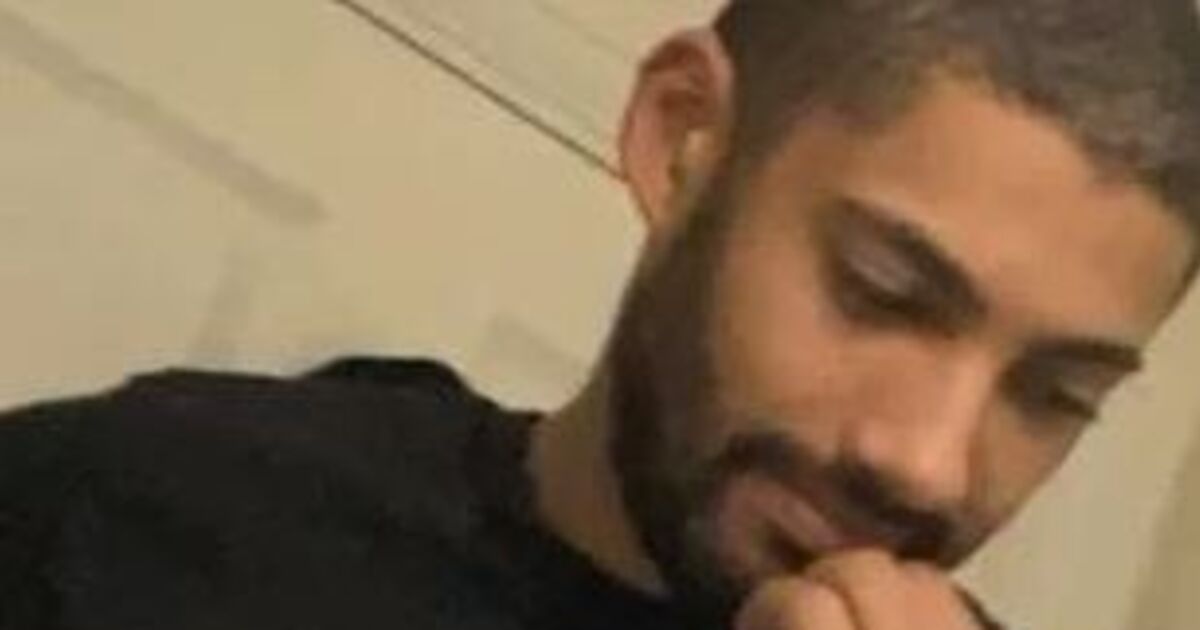World
British tourist ‘found dead in a drain’ after going missing on pub crawl | World | News

A British backpacker has been found dead in a drain, while on holiday with his girlfriend in Thailand. Theo Bailey, believed to be 31 years old, went missing while on a pub crawl on the island of Koh Tao.
It has been reported that the couple got drunk with others on holiday on March 18, before he vanished, reports the Mirror.
According to authorities, he was found dead in a shallow water drainage ditch the following day outside the Roctapus diving centre, and police believe he had been there for ‘several hours’ before being found.
His phone is also reportedly missing. Local police sayd the case ‘is still open’, but no arrests have been made. Thai police said they are waiting for the post-mortem results.
The couple were pictured laughing while drinking from buckets of alcohol at a local bar before he went missing.
Theo’s devastated partner Chantal, who is a teaching assistant working for Teaching Personnel based in Welwyn Garden City, Hertfordshire, posted several tributes online to her partner.
She said: “This is probably the hardest post I will ever have to do in my life. Last week, my best friend became an angel. Theo, having you in my life for 10 years will never be long enough.
“I will spend the rest of my life missing you and you will forever have my heart. Thank you for all the amazing and silly memories we have together. I miss you and I love you.”
The Brit was found near to Sairee Beach, near to where two other British backpackers were found dead in 2014. Hannah Witheridge, 23, and David Miller, 24, were killed there in the September.
The British backpackers were bludgeoned to death by two Burmese bar workers, Zaw Lin and Win Zaw Tun. The two killers, both 29 at the time, were issued the death penalty following an investigation. However, a decade later they called for a review into their case.
Due to the violent reputation of the island, it was dubbed ‘Death Island’ shortly afterwards.
World
Vladimir Putin humiliated after just one Russian tank rides in Victory Day Parade | World | News

He said that Russia‘s military is “always ready” but admitted the country is in a “difficult period.”
Putin also used his speech to rail against the West and bolster public support in Russia for the war in Ukraine.
He said: “Today we see how they’re trying to distort the truth about World War 2. It interferes with those who are used to building their essentially colonial policy based on hypocrisy and lies.
“Revanchism, abuse of history, and an attempt to justify the current Nazi followers is part of an overall policy of the Western elites to stoke new regional conflicts.”
He added: “We celebrate Victory Day against the background of the special military operation.
“We bow our heads to the memory of civilians killed in the neo-Nazis’ barbarian shelling and terrorist acts and our brothers-in-arms who died in the righteous fight against neo-Nazism.”
On the threat of a global conflict involving the West and Russia, Putin warned: “Russia will do everything to prevent a global clash, but at the same time, we will not allow anyone to threaten us. Our strategic forces are always on alert.”
Putin was sworn in for his fifth term as President this week. While Russia has seen various ceremonies, Ukraine‘s energy infrastructure has been hit by a barrage of Russian missiles.
According to reports, Moscow hit Ukraine with more than 70 missiles and drones overnight.
President Volodymyr Zelensky condemned the “massive missile attack,” while Ukrainian Energy Minister German Galushchenko said: “The enemy has not abandoned plans to deprive Ukrainians of light.”
World
‘The West must do better in its coverage of India’ | Express Comment | Comment

Daily Express announces trip to India to cover country’s general election
India, with its kaleidoscope of diversity and contradictions, stands as a captivating subject for global journalism.
However, Western media often falls short of accurately capturing the essence of this multifaceted nation.
Despite India’s increasing significance in geopolitics and culture, biases, constraints, and misinterpretations frequently cloud the coverage.
Recent scandals and exposés have shifted focus onto journalists’ motivations rather than shedding light on India itself.
India’s External Affairs Minister, S. Jaishankar, recently remarked: “I get a lot of these noises from the Western press and if they criticize our democracy, it’s not because they lack information.
“It is because they think they are also political players in our election.”
Don’t miss… India is delivering hope and prosperity for a new Kashmir – Amana Begam Ansari [COMMENT]
Defending foreign journalists covering India is becoming an increasingly challenging task.
A glaring example of the disparity between foreign media and Indian journalism surfaced during a panel discussion on violence in Manipur featured on BBC‘s Newsnight last year.
Amana Begam Ansari, a journalist for The Print, one of India’s leading news outlets, challenged the portrayal of Muslims and minorities facing genocidal threats.
She emphasized that while communal tensions exist in India, they are often exaggerated by Western media.
Ansari stressed the importance of data in dispelling misconceptions, asserting that India has never been safer for minorities.
Amana is a minority herself.
Her remarks left Victoria Derbyshire, the program’s anchor, visibly perplexed.

Modi votes in India’s election (Image: GETTY)
Don’t miss… India kicks off biggest election in world history with almost a billion voters [INSIGHT]
The question looms, why does the Western press tend to exaggerate threats in India?
India’s allure is undeniable, with its vibrant democracy, cultural richness, and economic dynamism.
However, delving into the complexities of Indian society demands more than surface-level reporting.
Western journalists often struggle with navigating cultural nuances, regional disparities, and the vast scale of the country.
Instances such as ABC News Australia’s Avani Dias’s claim of being forced to leave India, later revealed to be voluntary, further erode trust between foreign journalists and Indian society.
ABC News Australia, and those who leapt to her defence, have been left red-faced as a result.
This also raises pertinent questions about political neutrality.
Are S. Jaishankar’s words accurate? Do foreign journalists see themselves as “players” in the Indian political game?
One challenge is the tendency to view India through a narrow lens, shaped by preconceived notions or sensationalized narratives.
This can lead to oversimplification and distortion of issues, perpetuating stereotypes.
Moreover, the pressure to produce news quickly can compromise depth and accuracy, prioritising clickbait over nuanced reporting.
Bias also influences coverage, with Western media outlets sometimes prioritizing narratives that align with audience interests or geopolitical agendas.
This can result in incomplete or skewed portrayals of India, marginalizing alternative perspectives and reinforcing stereotypes.
Recent instances of The Guardian and The Intercept publishing leaks purportedly from Pakistani spies, pressurizing New Delhi amid allegations of the country’s involvement in an overseas assassination program, raise eyebrows.
Choosing to trust Pakistan’s notorious spooks over democratic India is a concerning choice, prompting questions about journalistic integrity and ulterior motives.
The Guardian’s recent editorial on India’s general election clearly indicates a bias, stating: “Indian voters ought to think hard about giving Narendra Modi another popular mandate.”
Editorials of this nature hinder the work of foreign press in India.
Collectively, foreign correspondents should express their concerns to The Guardian—asking them to refrain from biased reporting. Tell them to put a sock in it.
Access and privilege further complicate coverage, as Western journalists may struggle to connect with grassroots communities or understand the realities of everyday Indians.

Modi’s home state votes in Indian election campaign (Image: Getty)
This disconnect can lead to a distorted representation of socio-economic issues, overlooking marginalized voices. Amidst these challenges, journalistic integrity remains paramount.
Fact-checking, verifying information from multiple perspectives, and challenging biases are essential practices. Journalists must prioritise factual accuracy over sensationalism and engage with data rather than political theatrics.
Empathy and humility are crucial in navigating India’s vibrant debate, alongside a commitment to uncovering the truth.
By embracing complexity and diverse voices, Western journalists can contribute to a more nuanced and insightful portrayal of India on the global stage.
But never underestimate the power of numbers in understanding and accurately depicting the multifaceted landscape of India.
Chris Blackburn has worked in the Indian subcontinent for over 20 years. He has been awarded for his work on security, human rights, and democracy. He has led programmes combatting religious extremism and communalism in India and Bangladesh. He is also a co-founder of Global Friends of Afghanistan (GFA), a non-profit organisation based in the United States of America.
World
Joe Biden says he ‘wont supply weapons’ to Israel if it attacks Rafah in staunch warning | US | News

United States President Joe Biden said he would not supply offensive weapons that Israel could use to launch an all-out offensive on Rafah.
Although the Gaza city is believed the to be last major Hamas stronghold, concern has been raised over the welfare of more than a million people sheltering in the area.
In an interview with CNN, Biden said the US was committed to Israel‘s defence and would supply Iron Dome rocket interceptors and other defensive equipment.
He added: “We’re not going to supply the weapons and artillery shells used.”
The US has historically provided large amounts of military aid to Israel.
And this has only accelerated in the aftermath of Hamas’ October 7 attack that say 1,200 people killed in Israel with another 250 thought to be taken hostage.
Bidens decision to pause shipment of heavy bombs to Israel shows the growing rift between the US and Benjamin Netanyahu’s government.
Biden said Wednesday that Israel‘s actions around Rafah had “not yet” crossed his red lines, but has repeated that Israel needs to do far more to protect the lives of civilians in Gaza.
The shipment was supposed to consist of 1,800 2,000-pound (900-kilogram) bombs and 1,700 500-pound (225-kilogram) bombs, according to a senior U.S. administration official who spoke on the condition of anonymity to discuss the sensitive matter.
The focus of US concern was the larger explosives and how they could be used in a dense urban area.
Biden explained: “Civilians have been killed in Gaza as a consequence of those bombs and other ways in which they go after population centers.
“I made it clear that if they go into Rafah – they haven’t gone in Rafah yet – if they go into Rafah, I’m not supplying the weapons that have been used historically to deal with Rafah, to deal with the cities, that deal with that problem.”
“We’re not walking away from Israel‘s security. We’re walking away from Israel‘s ability to wage war in those areas.”
Defense Secretary Lloyd Austin earlier Wednesday confirmed the weapons delay, telling the Senate Appropriations Subcommittee on Defense that the U.S. paused “one shipment of high payload munitions.”
It also comes as the Biden administration is due to deliver a first-of-its-kind formal verdict this week on whether the airstrikes on Gaza and restrictions on delivery of aid have violated international and US laws designed to spare civilians from the worst horrors of war.
A decision against Israel would further add to pressure on Biden to curb the flow of weapons and money to Israel‘s military.
Biden signed off on the pause in an order conveyed last week to the Pentagon, according to US officials who were not authorized to comment on the matter.
Biden’s administration in April began reviewing future transfers of military assistance as Netanyahu’s government appeared to move closer toward an invasion of Rafah, despite months of opposition from the White House.
The official said the decision to pause the shipment was made last week and no final decision had been made yet on whether to proceed with the shipment at a later date.
US officials had declined for days to comment on the halted transfer, word of which came as Biden on Tuesday described U.S. support for Israel as “ironclad, even when we disagree.”
Israel‘s ambassador to the United Nations, Gilad Erdan, in an interview with Israeli Channel 12 TV news, said the decision to pause the shipment was “a very disappointing decision, even frustrating.”
Meanwhile Biden has faced pressure from some on the left – and condemnation from the critics on the right who say Biden has moderated his support for an essential Mideast ally.
Israeli troops on Tuesday seized control of Gaza’s vital Rafah border crossing in what the White House described as a limited operation that stopped short of the full-on Israeli invasion of the city that Biden has repeatedly warned against, most recently in a Monday call with Netanyahu.
Israel has ordered the evacuation of 100,000 Palestinians from the city. Israeli forces have also carried out what it describes as “targeted strikes” on the eastern part of Rafah and captured the Rafah crossing, a critical conduit for the flow of humanitarian aid along the Gaza-Egypt border.
Privately, concern has mounted inside the White House about what’s unfolding in Rafah, but publicly administration officials have stressed that they did not think the operations had defied Biden’s warnings against a widescale operation in the city.
The State Department is separately considering whether to approve the continued transfer of Joint Direct Attack Munition kits, which place precision guidance systems onto bombs, to Israel, but the review didn’t pertain to imminent shipments.
Itamar Yaar, former deputy head of Israel‘s National Security Council said the U.S. move is largely symbolic, but a sign of trouble and could become more of a problem if it is sustained.
“It’s not some kind of American embargo on American munitions support, but I think its some kind of diplomatic message to Mr. Netanyahu that he needs to take into consideration American interests more than he has over the last few months,” he said. “At least for now it will not impact Israeli capability but it’s some kind of a signal, a ‘be careful.'”
The U.S. dropped the 2,000-pound bomb sparingly in its long war against the Islamic State militant group. Israel, by contrast, has used the bomb frequently in the seven-month Gaza war. Experts say the use of the weapon, in part, has helped drive the enormous Palestinian casualty count that the Hamas-run health ministry puts at more than 34,000 dead, though it doesn’t distinguish between militants and civilians.
The U.S.-Israel relationship has been close through both Democratic and Republican administrations. But there have been other moments of deep tension since Israel‘s founding in which U.S. leaders have threatened to hold up aid in an attempt to sway Israeli leadership.
President Dwight Eisenhower pressured Israel with the threat of sanctions into withdrawing from the Sinai in 1957 amid the Suez Crisis. Ronald Reagan delayed the delivery of F16 fighter jets to Israel at a time of escalating violence in the Middle East. President George H.W. Bush held up $10 billion in loan guarantees to force the cessation of Israeli settlement activity in the occupied territories.
-

 Technology2 weeks ago
Technology2 weeks agoOld landline switch off confirmed in 84 UK locations – check your postcode
-

 Travel4 weeks ago
Travel4 weeks agoWorst country in Europe for pickpockets is a beautiful holiday destination | Travel News | Travel
-

 World4 weeks ago
World4 weeks agoTerrified woman went blind and nearly died after drinking coffee at Spanish airport | World | News
-

 Technology4 weeks ago
Technology4 weeks agoTaylor Swift ticket warning – fans urged to check their emails to avoid costly mistake
-

 Technology4 weeks ago
Technology4 weeks agoNew PC upgrade to rival Apple could convince you to ditch Windows 10 for good
-

 World4 weeks ago
World4 weeks agoMajor Falklands Islands warning issued as Argentina slams British ‘restrictions’ | World | News
-

 Education3 weeks ago
Education3 weeks agoThis beautiful hotel has been voted ‘the best in the world’ and it’s surprisingly cheap | Travel News | Travel
-

 Fashion1 week ago
Fashion1 week agoI tried the best-loved pan sold out 10 times in US and it’s £35 off
















